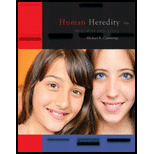
To determine: The way in which Rh incompatibility is involved in the hemolytic disease of a newborn.
Introduction: There are two types of Rh blood groups: Rh+ (have Rh antigen) and Rh- (do not have Rh antigen). Rh factor is a point of concern when the mother has Rh- and the fetus has Rh+ blood group. This condition can cause hemolytic disease of a newborn.
To determine: The Rh genotype of the mother in case of Rh incompatibility.
Introduction: There are two types of Rh blood groups: Rh+ (have Rh antigen) and Rh- (do not have Rh antigen). Rh factor is a point of concern when the mother has Rh- and the fetus has Rh+ blood group. This condition can cause hemolytic disease of a newborn.
To determine: The Rh genotype of the fetus in case of Rh incompatibility.
Introduction: There are two types of Rh blood groups: Rh+ (have Rh antigen) and Rh- (do not have Rh antigen). Rh factor is a point of concern when the mother has Rh- and the fetus has Rh+ blood group. This condition can cause hemolytic disease of the newborn.
To determine: The reason for the second child that has Rh+ antigen would be more susceptible to the attack from the mother’s immune system.
Introduction: There are two types of Rh blood groups: Rh+ (have Rh antigen) and Rh- (do not have Rh antigen). Rh factor is a point of concern when the mother has Rh- and the fetus has Rh+ blood group. This condition can cause hemolytic disease of the newborn.
Trending nowThis is a popular solution!

Chapter 17 Solutions
Human Heredity: Principles and Issues (MindTap Course List)
- Blood Types Are Determined by Cell-Surface Antigens Is it more important that transfused blood have antigens that will not react with the recipients antibodies, or antibodies that will not react with the recipients antigens?arrow_forwardA woman who is Rh- mates with a man who is Rh+. Since the Rh+ is dominant, what would the fetus's Rh factor type be?A person who is Rh- can donate blood to other people who are either Rh+ or Rh-. However, an Rh+ person can only give blood to who? Please explain.arrow_forwardWhy might erythroblastosis fetalis occur when an Rh- mother becomes pregnant with a second Rh+ baby (after exposure to the previous Rh+ baby's blood)? A) Erythroblastosis fetalis can only occur when an Rh+ mother becomes pregnant with an Rh- baby. B) After primary exposure, if the Rh- mother has an Rh+ baby, then antibodies the mom produces can cross the placenta and attack the baby's blood. C) The Rh- mother always produces antibodies to the Rh+ blood, so erythroblastosis fetalis is a condition that can happen to any Rh+ baby (first or subsequent).arrow_forward
- What will happen if an Rh-negative person receives a transfusion of Rh-positive blood? If a patient will receive a blood transfusion that is not matched to the patient’s blood type, what will happen? Explain briefly.arrow_forwardWhat Rh antigen is present in the red blood cells of this type of blood?arrow_forwardIf the thymus of an adult experimental animal is removed, the following observations can be made: (a) No immediate effect occurs, and (b) after 1 year, decreases occur in the number of lymphocytes in the blood, the ability to reject grafts, and the ability to produce antibodies. Explain these observations.arrow_forward
- If a person is given a transfusion with the wrong blood type, what mechanism of action is responsible for the reaction seen in the body? O 1) IgE binds to mast cells releasing cytokines 2) Antigen-antibody complexes (IgG, IgM and IgA) lodge in basement membranes of tissues, neutrophil degranulation damages the tissues O 3) T cells respond to the inappropriate cells 4) IgG and IgM bind to cells stimulating complement, triggering cell lysisarrow_forwardHow are the antibodiesagainst the Rh factor formed?arrow_forwardYou mix a few drops of a patient’s blood with ABO and Rh typing serums (antibodies against A, B, and Rh antigens), with these results: Anti-A: agglutination; Anti-B: no agglutination; Anti-Rh: agglutination. What is the patient’s ABO blood group and Rh type? A positive O negative O positive AB negative A negativearrow_forward
 Human Heredity: Principles and Issues (MindTap Co...BiologyISBN:9781305251052Author:Michael CummingsPublisher:Cengage Learning
Human Heredity: Principles and Issues (MindTap Co...BiologyISBN:9781305251052Author:Michael CummingsPublisher:Cengage Learning Human Physiology: From Cells to Systems (MindTap ...BiologyISBN:9781285866932Author:Lauralee SherwoodPublisher:Cengage Learning
Human Physiology: From Cells to Systems (MindTap ...BiologyISBN:9781285866932Author:Lauralee SherwoodPublisher:Cengage Learning


